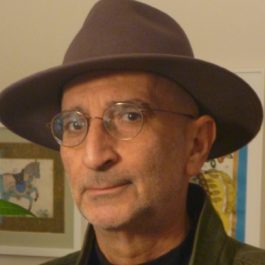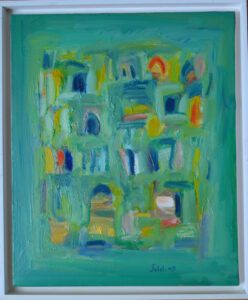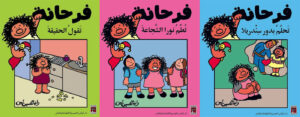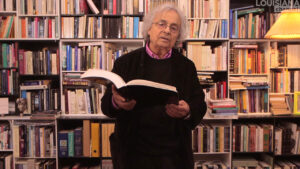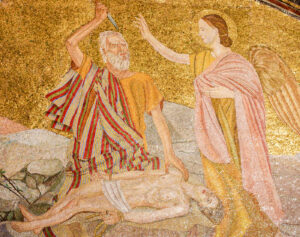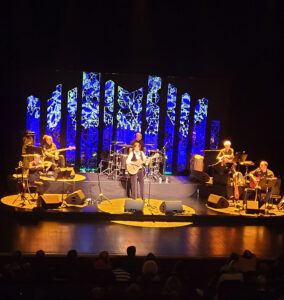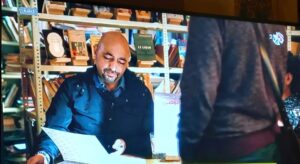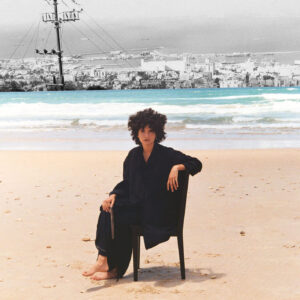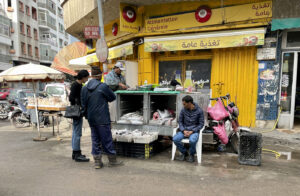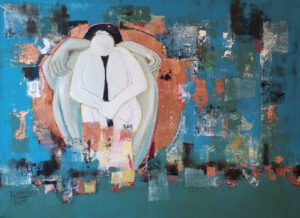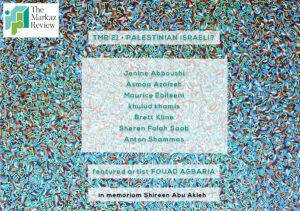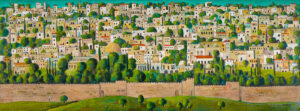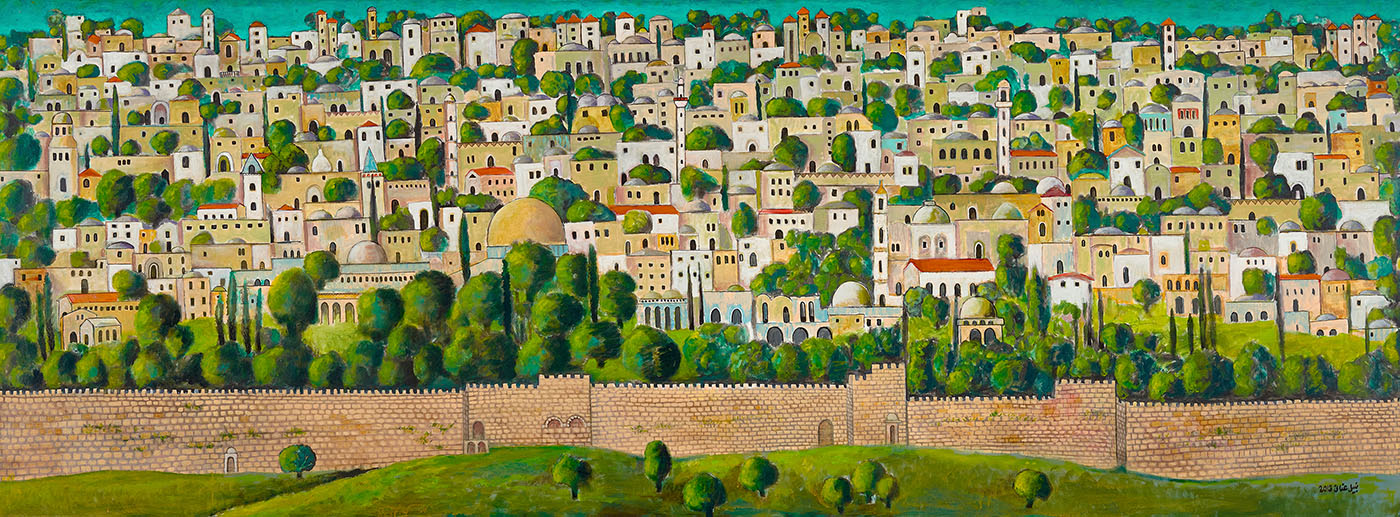
(In loving memory of Emile Habiby, 1921–1996)
“. . . Fragments. Or the anecdote as a form of knowledge.” —Paul Auster, The Invention of Solitude
Anton Shammas
A couple of years ago, I was kindly invited, in monolingual English, to be a panelist at a conference on bilingualism, on account of my dubious lingual past in Arabic and Hebrew. I immediately declined the flattering invitation, explaining to the organizers that it had been a while since I’d last thought of myself as an active bilingual writer and translator of these two mutually exclusive languages. Hebrew, in the last two decades or so, seems to have bowed out gracefully from my linguistic state of mind, and the bilingualism I had cherished for decades is no longer a distinct part of my lingual identity, whatever that is.
Then I reconsidered the invitation and changed my mind, and that change of mind, curiously enough, happened in English, as Arabic and Hebrew were mutually absent from my decision-making process for a change. I thought, in English, that after some fifty years of life within Arabic and Hebrew and life in the precarious intersections between the two, it’s probably time for me to pause and look back at my humble and equally questionable history as a bilingual writer and translator of these two languages and maybe draw some introspective conclusions as a lingual retiree, for what it’s worth.
When does one become a bilingual or, to paraphrase the ninth-century classical Arabic writer al-Jāḥiẓ, when does one begin to feel comfortable with having two tongues in one’s mouth?
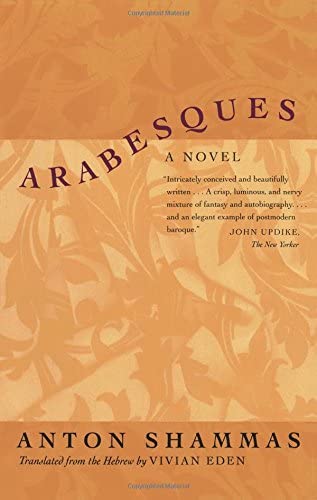
I should immediately append a disclaimer: I really know nothing about bilingualism, and all I seem to know is something about my own life as an alleged bilingual. The following fragments, then, are extremely personal and, as such, could be unreliable and, worse still, unverifiable.
So, maybe I should start off by posing the seemingly simple questions: When does one become a bilingual or, to paraphrase the ninth-century classical Arabic writer al-Jāḥiẓ, when does one begin to feel comfortable with having two tongues in one’s mouth? And if you don’t happen to be, say, a George Steiner, is there a moment in time when the knowledge of, or the proficiency in, a second language reaches the same level or exceeds that of the first? Is that an objectifiable and measurable process?
Is the knowledge of a language gauged by the ability to speak that language or by the ability to write it well, or by both? Is bilingualism defined by the ability to speak two languages equally well? And if so, what does it mean, in effect, to speak a language? Is that at all possible — to speak a language, to dwell and feel at home in a language, let alone in two?
Wise Heidegger would tell us that it is language, as such, that speaks, not the subject:
“Language speaks. . .To reflect on language thus demands that we enter into the speaking of language in order to take up our stay with language, i.e., within its speaking, not within our own. Only in that way do we arrive at the region within which it may happen — or also fail to happen — that language will call to us from there and grant us its nature. We leave the speaking to language. . .Language speaks. Humans speak in that they respond to language.”
So, can the bilingual speak?
For if the bilingual can speak only when responding to language, which of the two would they be responding to, and how would the two languages of bilingualism speak simultaneously on their behalf? And what happens when the two languages of the bilingual are mutually exclusive, mutually contestable, mutually trying so violently yet so unevenly to silence each other, on so many levels, like Arabic and Hebrew have been doing for almost 150 years now? And is it possible for a bilingual in Arabic and Hebrew to speak about that bilingualism in either language, or is it only possible to do so using a third, seemingly neutral language? For if you chose Arabic in order to speak, Hebrew, for more than five decades the language of lethal military occupation, would be seemingly relegated to the status of a second fiddle, and vice versa. Which means, in effect, that bilingualism can be addressed and defined only from the “without,” as Beckett, probably the greatest bilingual of all times, refers to the outside in his play Endgame. Is there an outside of language or, better still, outside of bilingualism, a “without” from which one can examine what’s within the two languages? Is that “without” possible to find only inside a third language?
That said, as a retired bilingual desperado, it is also hard for me to find the right words in any of the three languages in which I consider myself to be a refugee to talk about bilingualism. It’s interesting, though, that having a third language to discuss the adversarial, mutually exclusive relationship between Arabic and Hebrew adds a spin of sanity to that act, making the linguistic and political entanglements of my Arabic and Hebrew, and the asymmetrical power relation between the two, seem easier to handle, easier to unravel. Still, who knows, maybe that is yet another illusion.
Now, let me tell you three anecdotes in totally random order which I think might capture, in varying degrees of relevance, some of the things that come to mind when I think about my own bilingual past, a past in which whenever I wrote in Hebrew, Arabic would always be its unconscious, and vice versa.
1. The Black Rooster of the Rabbi
Some fifteen years ago, around the time that the Hebrew language and I had a falling out of sorts, something very amusingly uncanny happened to me. A friend of mine, a scholar of Hebrew literature, had written a paper which she wanted to run by me. “In a 1980 anthology of new Hebrew poets,” the first sentence read, “Anton Shammas [that would be me] published a gripping poem titled ‘Dyokan’ (Portrait). This poem describes the experience of assimilation into the language of the Other in intensely visceral, corporeal terms, as a kind of violent invasion by a foreign presence.”
By 1980 I must have been already done with poetry, in both Arabic and Hebrew, and thought I was ready for the intimidating experience of switching to writing fiction, so how could I have written and published that poem? Besides, the Hebrew word dyokan, or portrait, sounded so alien and so unusual to my ears — and come to think of it, so intrusive for someone whom I remembered would have refrained from opening up like that. Then I went on reading:
“Yet the poem also contains a number of elusive subtexts and baffling references. Through a complex network of intertextual allusions and associations, it invokes the famous midrash on Rabbi Shim‘on bar Yohai in the cave — without ever mentioning the word ‘cave.’ The poem ends enigmatically with this line: ‘A black rooster beating its wings. Jerusalem.’”
I was totally dumbfounded: the famous midrash on Rabbi Shim‘on bar Yohai in the cave and a black rooster beating its wings? I pricked up my ears, but no bells were ringing. Was the writer making it all up, I wondered? Because I really didn’t have any recollection whatsoever of writing about that Rabbi, or about his black rooster for that matter.
I looked the poem up in the two volumes of Hebrew poetry I’d so irresponsibly published in the seventies, and at which I hadn’t looked for a long time, but couldn’t find that poem and was so curious to know what that poem was all about.
I couldn’t find the anthology mentioned in the paper, so I Googled the poem, and all I could find were essays written about it by teachers of Hebrew literature, as the poem seemed to have been part of the curriculum of Hebrew literature in Israeli high schools. But the poem itself was nowhere to be found, and I was now more interested in trying to remember it, trying to conjure it up, but failed miserably.
I couldn’t remember the poem, and, worse still, I couldn’t remember the person who had written that poem, apparently in the late seventies. True, I used to have blackouts during that decade, as some of you may have had, but the total erasure of the memory of writing a text in Hebrew, and the total erasure of the memory of that person I used to be, was quite shocking, unsettling, and disorienting.
And I was wondering, Did that happen because I was no longer that bilingual person I used to be when I recklessly moved around that no man’s land, between Arabic and Hebrew? Does language really inhabit us, in the form of either an original or a translation? Do we really inhabit and dwell in our language, or in our languages?
Gil Hochberg, who was not the writer of that paper, writes in In Spite of Partition about my work in Hebrew: “showing how amidst what appears to be a promise of cacophony and a hopeful act of multifaceted translations (borrowing of multiple voices and tongues), one finds a bitter reminder of the limits of such affirmative translatability: clear limits, set by and carefully guarded by the ethno-national territorialization of linguistic zones.”
In other words, are these clear limits, “set by and carefully guarded by the ethno-national territorialization of linguistic zones,” so discursively powerful that any attempt, personal or otherwise, at challenging them is predetermined to fail or to be swallowed whole by these ethno-national linguistic zones and to be turned into a part of the system of power against which these attempts were aimed at in the first place?
2. Translation at Gunpoint
In the early ‘80s in Jerusalem, around the time that I was done with writing poetry in Arabic and Hebrew, I started entertaining the idea of writing a novel in Hebrew. I had been investing most of my time and energy in translating fiction and poetry from and into Hebrew and Arabic, when I was asked by a dear friend, the late Daniel Amit, then a physicist at Hebrew University in Jerusalem and a very anti-Zionist political activist, who had just founded a small publishing house, Mifrās (sail), to translate into Hebrew a novel by the Palestinian writer Emile Habiby, Al-Mutashā’il (The Secret Life of Saeed: The Pessoptimist, or simply The Pessoptimist).
The small press had a very clear political mission: to publish in Hebrew books on Palestine, Palestinian politics, and Palestinian literature. Habiby had served for twenty years as a Knesset member, representing the Israeli Communist Party in the Israeli Parliament, before he decided in 1972 to leave that wasteland behind and focus on writing fiction.
When Al-Mutashā’il was published in 1974, it was hailed almost immediately by literary critics in the Arab world as a masterpiece of Arabic style. So, when Daniel asked me to translate the novel into Hebrew, I told him immediately that it was simply impossible to translate Habiby’s daunting Arabic style. But he wouldn’t take no for an answer. In order to support my claim, I showed him a raving review of the novel, published in Hebrew in the daily Haaretz, by Shimon Ballas, an Iraqi-born Hebrew novelist and renowned Israeli scholar of Arabic literature, in which he stated unequivocally that the novel would be impossible to translate into any language. Daniel dismissed the claim on the spot and said, many decades before Emily Apter, that there was no such thing as “untranslatables.” So, I asked him for some time to sleep on it. “There’s no such thing as sleep either,” he said, but still agreed to give me some time to reconsider.
I was living in Jerusalem at the time, and even though I had a steady job, it was hard for me, every now and then, to pay the rent, as translation didn’t pay that well. Amit had offered me $500, a very considerable amount in those days, so that was very tempting. Some weeks later I changed my mind (in Arabic) and told him (in Hebrew) that I’d translate the novel. We signed the contract (in Hebrew), and I could pay the rent. Then I set out to trans late Emile Habiby into Hebrew, only to realize after struggling bitterly with the first couple of pages that for one, the novel, all in all, was really untranslatable and two, worse still, I had spent the $500.
I still can’t remember how I did finally find the courage to call Daniel and break the bad news to him. But I remember it was a Thursday afternoon, and after a long, elaborate, and awkward apology, I told him that it would take me some time but I’d definitely return the advance money.
There was a long, long silence, and I could clearly hear Daniel’s measured, passive aggressive breathing. Then he said, very calmly, “Listen, Anton. You know that I define myself as anti-Zionist, but I had to serve in the army, and I own a gun. As you surely know, I know where you live, and on Thursday next week, ‘at five in the afternoon,’ as that famous line goes in Lorca’s ‘Lament for Ignacio Sánchez Mejías,’ next Thursday, at five in the afternoon, I’ll show up in your apartment building on 7 Menorah Street. I won’t take the stairs to where you live on the second floor but will open your mailbox at the entrance to the building, and in your mailbox, I’ll find the translated first chapter of the novel. Then I’ll come back the following Thursday, at five in the afternoon, and there will be waiting for me the translated second chapter of the novel, and so on, Thursday in and Thursday out, at five in the afternoon, until we’re done. Now, if I show up next Thursday, at five in the afternoon, and I don’t find the translated first chapter, I’ll take the stairs to the second floor, I’ll knock on your door, you’ll open the door, and I’ll shoot you.”
I chuckled because I thought he was joking, but he was dead serious.
The novel had forty-five chapters, so you can imagine that after forty-five Thursdays, the Hebrew translation of Al-Mutashā’il was completed.
And I have lived to tell all about it . . . in English.
3. Translation as Revenge
My translation of The Pessoptimist came out in 1984, and Habiby, whose Hebrew was far better than he claimed, was very happy with the translation. A year later, in 1985, he published his second novel, lkhtayyeh, which he sent to me with the very sly inscription, “To my beloved brother Anton — all I’m asking is that you read this book.” But I knew he was asking for more, much more than a no-strings-attached reading, and he knew that as well.
Those days, in between translations, I was wrapping up my own novel, in Hebrew, when I was asked by another publishing house, and a very persistent lobby of Habiby’s fans, to translate lkhtayyeh. Well, I had no choice, so I did, and when the translation was published in 1988, I had already left Israel for good the previous year. Then he published his third novel, Sarāyā, in 1991, my most favorite novel of his. By that time, we’d become long-distance close friends, as I had earned his full trust not only as a devout in-house translator, but also as an occasional editor and fact-checker. He would send me the early drafts of the chapters and ask for comments and suggestions, but for some weird reason we never discussed the potential translation. When the novel came out, he mailed it to me in Ann Arbor, Michigan, with the inscription “Your friendship alone is an honor for me, so what can I say when you are also my translator? I owe you more than you’ll ever imagine. Yours, Emile Habiby.”
I was deeply flattered, of course, and deeply grateful, but equally apprehensive and anxious. And then on page 151 of the Arabic original, I read the following paragraph, which hadn’t been in the early draft he had shown me (and this is from the English translation of Peter Theroux, which I’ve also edited, along with Peter Cole):
I am no longer going back to tell you about Sarāyā or how I searched for her . . . until that evening! So, as the Arabs say, what has driven you away, after you showed me your love? In other words, what, in fact, has happened? I answered him: what in fact has “hap” in it. And that which has won’t happen again. And with this I challenge Anton Shammas, the Palestinian translator who has translated my books from Arabic into Hebrew — I challenge him to translate this juxtaposition and this pun, into any language or register, near or far, high or low, as compensation for what the speakers of Hebrew have taken from us and from our language.
ﻓ ذا ﻋﺪا ﻣ ﺑﺪا؟ أﺟﺒﺘﻪ: ﻣﺎ ﻋﺪا إﻻّ ﻫﺬا اﻟﺬي ﺑﺪا. وﻣﺎ ﻳﺒﺪ ﻣﺎ ﻋﺪا وﻟﻦ ﻳﻌﻮد. وأﺗﺤﺪى
أﻧﻄﻮن ﺷ س أن ﻳﱰﺟﻢ ﻫﺬا اﻟﻄﺒﺎق واﻟﺠﻨﺎس إﱃ أ ّي ﻟﻐ ٍﺔ ﻗﺮﻳﺒﺔ أو ﺑﻌﻴﺪ . . .
ומה נשתנה, אם כן, הלילה הזה? או, כמאמר הערבים, מא עדא ממּא בּדא
)שפירושו, מילולית: מה הרחיק אותך ממני אחרי שהראית לי אהבה.( עניתי:
לא ﬠ ָדה עלינו זולת אשר ָבּ ָדה. ואשר בעדיינו התע ָדּה, ואחר ִנ ְת ָבּ ָדּה ְו ֻה ֲﬠ ָדה,
. . . ָדה ﬠ
לא ישוב עוד ֳק ָבל
So Habiby addressed me directly in the text, by name, challenging me to translate a certain Arabic idiom into any language, but specifically meaning Hebrew. And let’s face it, I’d asked for it and had only myself to blame. And I thought that beyond the sly literary device, the literary hailing, and beyond the performative challenge, and beyond the delightful Althusserian interpellation, Habiby was telling me, in effect, that I could speak only as a translator, as his translator. And that was a benign variation on the theme of translation at gunpoint.
Shai Ginsburg has argued that “unlike the great resistance Shammas the author has raised, Shammas the translator was (and is) well received. As a translator from Arabic into Hebrew he — like other translators — allows Israeli culture to present itself to itself as liberal, as sharing in modern universal humanist values. As a Hebrew author, on the other hand, Shammas unmasks the bad faith of this ‘liberal’ image for as such he asks Israeli culture to do what it cannot do: to follow through its espoused values outside the literary realm.”
A couple of months after the publication of Sarāyā’s Hebrew translation in 1993, when I was visiting my family in Haifa, I was asked by the editor of Ha’īr, a local newspaper published in Tel-Aviv at the time, to conduct a lengthy interview with Habiby. I reminded him when we met of something that we had managed to avoid mentioning all those years, an early encounter of the embarrassing kind in the mid-seventies. Those days I was working for the public TV station in Jerusalem, as a producer of a literary program, and wanted to interview him about his first novel, The Pessoptimist, published in 1974. My division director at the time, who had been a communist in his youth, succumbed to the zeal of converts and rejected the idea because of Habiby’s political views. But later he changed his mind, for the sake of the good old days. So, I made it to Tel-Aviv with the TV crew to conduct the interview.
In 1974, I had published two collections of poetry, in Hebrew and Arabic, respectively, so I foolishly enough decided on a whim to give a copy of the Arabic book to Habiby when we met. Some months later, our mutual friend Shimon Ballas, mentioned above and who was at the time the chair of the Arabic department at Haifa University, organized a conference about The Pessoptimist, at which Habiby was supposed to give the keynote speech. Having had already broken the spell, I traveled to Haifa with my TV crew to prepare a report on the conference. I was sitting in the back of the amphitheater, next to the cameraperson, and Habiby started his keynote in Arabic, totally oblivious of my presence. “Before I talk to you about my work,” he said in his singular baritone, “let me first read to you a poem by a young Palestinian so-called poet, just to show you the kind of ridiculous and hollow stuff written these fateful days by our young generation, those who have no values and no cause to fight for.” Then, in a hilarious mocking tone which only he could master, he started reading a poem from my book that I had given him, saving me the embarrassment of identifying me by name. I pretended that I didn’t care.
I was telling the story to Habiby now as we sat for the interview, more than twenty years later. Three years before that, in 1990, he was awarded the very prestigious Al-Quds Prize for Literature, by the book-challenged Yasir Arafat himself, and two years later, much to the chagrin and outrage of Habiby’s fans in the Arab world and then Israeli prime minister, book-challenged Yitzhak Shamir, he was awarded the prestigious Israel Prize for Literature.
He clutched his bowed head with both hands in disbelief and said,“Oh my god, all these years that we have known each other, I was hoping you would never remember that shameful episode.” Twisting the knife, I told him that when he finished reading my poem that day at Haifa University, I kept thinking to myself, What would be the perfect revenge? And you know what, I added less than half-jokingly, I decided to translate your work into Hebrew, hoping that one day you might be awarded the Israel Prize for Literature.
That was my perfect revenge.
The very juicy, meandering, elaborate, multi-layered, and colorful Arabic curse he produced was yet another untranslatable masterpiece.
In conclusion, let me go back to Heidegger and see if one of his discussions on building and dwelling could give me a proper metaphor for what I have in mind. Mind you, while I like anecdotes, I certainly don’t like metaphors, because I think they seem at first to beguilingly offer us a neat way out, a tangible embodiment of an idea we have, then after a while things fall apart, the metaphor collapses, and we are left in more puzzlement and confusion than we had been in before the metaphor showed up. Frustrated readers of Benjamin’s metaphor-riddled essay “The Task of the Translator” would get my drift.
I’m quoting at length from the second chapter of Heidegger’s “Building Dwelling Thinking”:
A bridge may serve as an example for our reflections. The bridge swings over the stream “with ease and power.” It does not just connect banks that are already there. The banks emerge as banks only as the bridge crosses the stream. The bridge designedly causes them to lie across from each other. One side is set off against the other by the bridge It brings stream and bank and land into each other’s neighborhood. The bridge gathers the earth as landscape around the stream. Even where the bridge covers the stream, it holds its flow up to the sky by taking it for a moment under the vaulted gateway and then setting it free once more. The bridge lets the stream run its course and at the same time grants their way to mortals so that they may come and go from shore to shore.
There might be something in this image of a bridge-long quotation that could offer a different perspective of looking at bilingualism as the bridge that connects two languages. However, the bridge of bilingualism does not only connect the two banks that are already there, but rather it makes them emerge as two languages when it crosses the river.
But then again, bridges are hard to build, and sometimes they fail to reach the other bank, and sometimes they collapse; rivers run dry, and metaphors fall apart, leading us to nowhere.
And we cannot speak.
. . . But we keep trying.
This essay first appeared in the Michigan Quarterly Review, Vol 61, No.2, Spring 2022, as “Can the Bilingual Speak?” and appears here by special arrangement.



